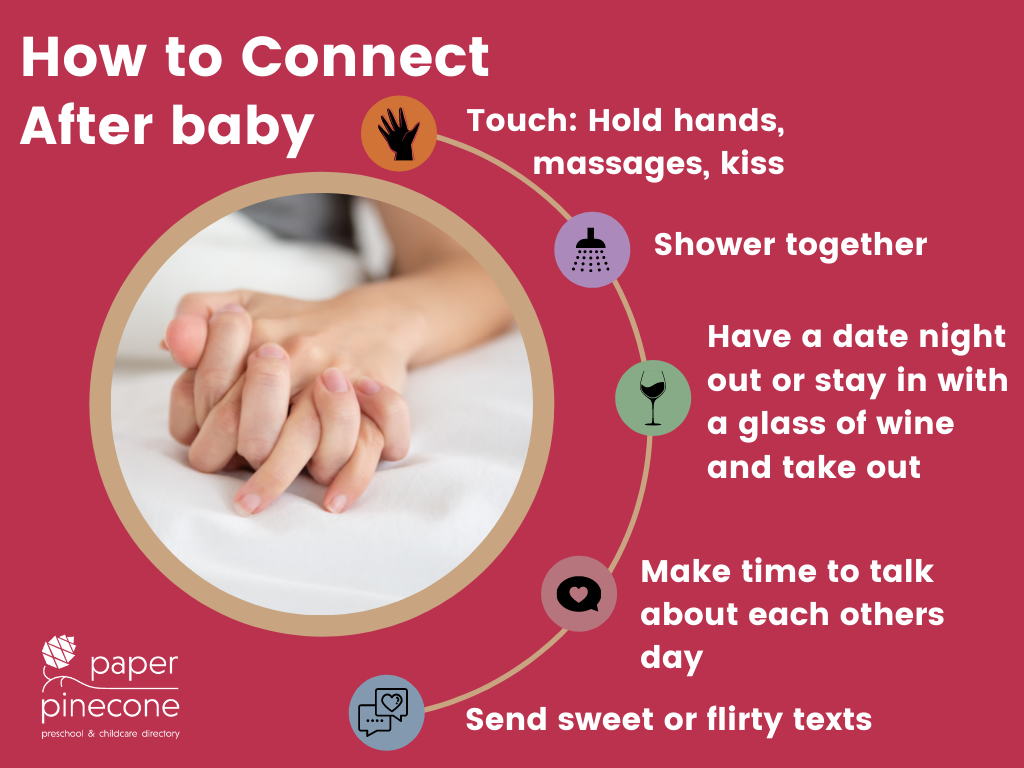Sex after Baby - What's Normal? What's Not?

Published Date: 03/28/22
If you only have a minute...
Pregnancy and childbirth lead to physical changes that have an impact on your sex life
Breastfeeding can affect your sexual appetite and your breasts may leak after an orgasm
It's normal for women to have vaginal dryness, bleeding after postpartum sex, and experience painful sex
Most women say that postpartum sex feels different and strategies, like strengthening the pelvic floor, can help it feel like it did prior to pregnancy and childbirth
Some women find that they're ready to start having sex soon after birth, and others need several months before they're ready
Speak with your doctor to get the okay to engage in sex postpartum - you should wait until you aren't bleeding anymore and vaginal tissue has fully healed, especially if you experienced vaginal tearing to prevent infection
Everything you want to know about your sex life after having a baby...
Let's talk about sex baby. Well, sex after a baby.
For many women, the only thing they want to do in the bedroom after having a baby is sleep. But some new moms find they're ready to get back in the saddle in the early weeks. This very broad spectrum of sexual desire is totally normal for sex after giving birth.
Regardless of the timing, almost all women have questions before they're ready to hit the sheets, like:
Is my vagina different?
When can I start having sex?
Will it feel different to me?
Will my vagina feel different to my partner?
Read on to find out that and more..
In this article:
How long after giving birth can you have penetrative sex?
What is normal during postpartum sex?
How does breastfeeding affect sex?
Does postpartum sex feel different?
Tips to have more enjoyable sex childbirth
What can I do about my low sex drive?
How can my partner and I connect after baby?
How soon after giving birth can I get pregnant?
Facts no one will tell you about sex after baby
How long after giving birth can you have penetrative sex?
There are many factors that determine how ready you feel for penetrative sex. These include pain levels, fatigue, sex drive, estrogen levels, postpartum bleeding, vaginal dryness, and the fear of painful sex or pregnancy.
According to The American College of Obstetricians and Gynecologists, there is no official set waiting period to resuming penetrative sex but doctors recommend that you wait 4 to 6 weeks postpartum so that you have time to heal.
For many women, sex after birth will largely depend on whether you had a vaginal birth or cesarean delivery.
If you had a vaginal delivery, you should wait at least four weeks to have sex, while those who had cesareans will have to wait at least six weeks postpartum.
However, if there were any complications during or after delivery, for example, if you had a perineal tear or an episiotomy, it is important to wait until you are completely healed before having sex after giving birth. You should also wait until you've stopped bleeding before attempting postpartum sex.
If you want to resume having sex sooner, talk to your healthcare provider about it first so that it doesn't negatively affect your physical recovery and cause unnecessary pain. It is never a good idea to get right to it without any professional go-ahead.
Related: If you pee when you sneeze (or laugh, or cough) read this! 9 ways to manage bladder leaks
What are the risks of having sex too soon after giving birth?
If you resume sex too early, you risk wounding yourself, getting uterine infections, re-opening a cesarean incision, or postpartum hemorrhage. Cesarean incisions might appear fine outside but the inside may have not healed yet so it is important to wait the full six weeks.
The risk of a complication in the postpartum period is highest the two weeks after giving birth which is why no matter how “OK” and ready you feel during the postpartum recovery process, you should heed your physician’s advice.
Make an earlier appointment if you don't want to wait for the six week postpartum visit.

What is normal during postpartum sex?
After birth, your body goes through many physical and hormonal changes. You will have vaginal bleeding with some blood clots (called lochia) as your body rids itself of the extra blood and tissue in your uterus. New moms may find these blood clots may be surprising large - up to the size of a plum, according to the Cleveland Clinic, but as long as they're not larger, it's all part of the natural healing process and the blood flow should stop within 4-6 weeks.
Vaginal dryness & painful sex after birth
After giving birth, your estrogen levels drop rapidly - they're at pre-pregnancy levels within 24 hours! This rapid decrease can leave your vagina dry, which in turn, can lead to more pain during sex.
As your period returns and becomes regular, this dryness will typically go away on its own. But, it may not happen quickly - one study found nearly half of women reported that their vagina felt dry a full six months after having a baby Generally, it's a longer process for nursing moms.
Using a water-based lubricant can help make intercourse more enjoyable.
Does postpartum sex feel different?
For the first few weeks after delivery, your vaginal tissue still has a limited capacity for stretching which can affect how sex feels. This effect is usually temporary and you may be able to quicken the healing process by doing Kegel exercises to strengthen your pelvic floor.
After pushing a baby through your birth canal, it is also typical to experience vaginal dryness and discomfort as the vaginal muscles and walls heal. Even moms who had a cesarean may notice changes due to their cervix having been dilated.
Dr. Shrikhande had a blog published with @meet_rosy titled "How is Sex Different Postpartum?" Check it out at https://t.co/mhqpJ3d4mU#pelvichealth #pelvicpain #chronicpain #spoonielife #sexualhealth#womenshealth #chronicpainwarrior #chronicillness #pelvicrehabilitation pic.twitter.com/KOoVupRAmx
— Pelvic Rehabilitation Medicine (@PelvicRehab) January 19, 2022
As your body struggles to balance its hormones, you might notice unusual experiences during postpartum sex. You may have light bleeding or your breasts may leak milk after an orgasm. These are a perfectly normal hormonal responses. You can prevent leaking by pumping before sexual activity.
When you do engage in sexual activity, you may realize that it feels quite different from the way it did before pregnancy as your body heals, especially during the first month if you delivered vaginally.
If you had stitches from an episiotomy or tear, you can help the healing process by taking a stool softener to prevent constipation. Scar tissue from an episiotomy can cause some discomfort but will get better overtime.
You may also be feeling self conscious about the way your vaginal area looks, making it harder to enjoy sex. With time, it will tighten up as your pelvic floor muscles heal.
Also read: FDA approves drug to treat severe postpartum depression

Tips to have more enjoyable sex after childbirth
It is normal to experience slightly painful postpartum sex in those first few attempts. You can ease discomfort by taking some or all of these steps:
• Increase foreplay. Give your body time to produce its own natural lubrication if you are experiencing vaginal dryness.
• Experiment with alternatives to vaginal sex if it is too painful. You can try oral sex, massages, or even mutual masturbation. Just find whatever feels good and work with it.
• Seek pain relief beforehand. Some relief options include emptying your bladder, taking a warm bath, or even taking an over the counter pain reliever. If high milk production causes discomfort in your breasts, pump before.
• Use a water based lubricant. Breastfeeding in particular tends to dry up the natural vaginal lubrication.
• You can also apply ice to the area if you experience burning afterwards. To do this, put ice in a piece of cloth and gently rest it over your vagina.
If you had a vaginal delivery, penetration may also feel different due to reduced vaginal muscle tone. You may notice that the process of penetration feels strange, and not in a good way. If sex continues to be painful, consult your doctor for treatment options.
How does breastfeeding affect sex?
Breastfeeding reduces a person’s libido and parenthood is exhausting, so it is perfectly normal to be touched out. The very act of breastfeeding places your body and mind in a state that tries to prevent pregnancy too soon. Peer reviewed studies show that getting pregnant too soon after one pregnancy can lead to more risks both for mom and baby.
Breastfeeding releases oxytocin which lowers estrogen and your sexual desires so you don’t want to have sex. Your libido should return over time and once you stop breastfeeding.
When you do engage in sexual activity, breastfeeding makes the chances of getting pregnant lower although it is still very possible.

What can I do about my low sex drive?
It is natural to not be interested in resuming sex after you gave birth. Having a newborn can be physically and emotionally exhausting. This is especially true for new moms or if you had a particularly difficult pregnancy.
Sometimes, your mental health could be the reason for your reduced sex life which is far more serious, such as negative feelings about your body or postpartum depression.
Be open with your partner. If you are uncomfortable with your postpartum body and not feeling sexy, or hesitant to explore sex because you are afraid it will hurt, talk to them so they can help you feel comfortable. They will likely be more understanding that you think.
However, if you are showing signs of postpartum depression, such as having severe mood swings, loss of appetite, not feeling connected to your baby, or a general feeling of helplessness and lack of joy, contact your medical provider. They will prescribe the appropriate treatment option for you, which may include therapy and medication.
How can my partner and I connect after baby?
Until you are ready to have sex again, intimacy can be maintained in lots of other ways. Sex is more than just the act. All the moments leading up to it also count.
As much as you want to soak in every moment with your baby, it's good to let a trusted family member or friend babysit so you and your partner can get out for a quiet meal or even just a smoothie coffee if you aren't ready to be gone for too long.

Don't forget to take care of yourself. Drink good coffee, wear clothes that feel good, accept help from others, watch your favorite show with snacks and water when feeding the baby.
Let your partner get some quality time with the baby while you take a hot shower (this is basic hygiene and not a luxury but many moms find it hard to make time for basics).
How soon after giving birth can I get pregnant?
After having a baby it is possible to get pregnant again surprisingly quickly. For many women who are not breastfeeding, the first ovulation occurs at around 6 weeks, but it can happen even earlier.
For nursing mothers, breastfeeding can act as a natural form of birth control called LAN (Lactation Amenorrhea Method) and if followed correctly, there is less than 2% chance of pregnant. This is most effective only for the first 6 months postpartum, if you haven't started menstruating, are exclusively breastfeeding (no water or other foods), and are breastfeeding on demand and often.
You should, however, keep in mind that breastfeeding is not a fail-proof birth control method. If you want to have sex but do not want to risk another pregnancy, you need to use more reliable methods of birth control, such as barrier methods, implants, and IUDs.
Immediate contraception options include barrier options (condoms) or progestin-only contraceptives. If you would prefer to use an intrauterine method such as a copper, diaphragm, or some other fitted device, discuss it with your health care provider first.
Also, if your preferred contraceptive method contains estrogen or progesterone, and this includes most pills and vaginal rings, consult your doctor first before using them.
Getting Pregnant Again
If you intend to have another child, it is a good idea to wait a while before doing so. This is because getting pregnant too quickly after a pregnancy increases the risk of premature birth and birth defects. According to family physicians, it is best to wait 12 to 18 months after giving birth to get pregnant again.
If you really want to have another child sooner than that, consult your health care professional first. They are the ones who are in the best position to understand your health history and advise you accordingly.

Don't miss: How hugging your baby benefits their brain development
Facts no one will tell you about sex after baby
1. It may not feel good at first. Besides the physical trauma, your body’s hormones are also still readjusting. So keep a glass of wine handy, and bring lots of humor along because it will probably be nothing like you are used to. Also, do not forget that lube is your new best friend.
2. For several months immediately after birth, you may have a very low sexual desire. This is natural and completely normal. It is your body’s way of trying to prevent another pregnancy too soon.
3. There may be a little more wiggle room down there. Things may not be as tight as they used to be. You can hasten the return to normal by doing Kegel exercises.
4. Once you have a baby, sex becomes more important. Living like roommates is not a good thing because it leaves room for resentment and disconnection. Having sex bridges that gap and brings the two of you closer to each other.
5. After baby, it can be challenging to get alone time in bed. Be flexible and take what you can get. Do it in the bathroom or the walk-in closet. It can add to the excitement and make it more interesting.
6. You do not have to do it at night. Make your baby’s nap time your playtime.
7. This may surprise you, but sex after having a baby can be better than before. You feel more connected to your body and you can have more intense orgasms.

Related: How to raise resilient children
Final Thoughts
Pregnancy and childbirth bring a lot of changes which can affect physical intimacy.
Most doctors recommend waiting about 4 to 6 weeks and until you stop bleeding before resuming sexual intercourse after delivery. This time will allow your body to heal from pregnancy and childbirth.
The decision of being ready is a very personal one, so every couple must communicate and address each other’s concerns.
If you are experiencing painful sex after birth or it's uncomfortable for you, let your partner know. The most important thing is to go at your own pace.
It's totally normal for it to take a lot more than six weeks to feel ready. Because when it’s all said and done, intimacy should be fun and pleasurable for both partners.
By Crystal Teegarden

Crystal is a gentle parenting mama who loves reading, cooking, and exploring new trails with her husband and son. She is from Los Angeles but currently lives in Portland, OR where she is eating all the vegan food.
Paper Pinecone is the #1 most trusted childcare directory giving parents access to the best preschools and best daycares near you. Parents always search free and childcare providers always list free. Send inquiries about the best daycares and preschools to [email protected].
This post may contain affiliate links.
You should, however, keep in mind that breastfeeding is not a reliable birth control method. If you want to have sex but do not want to risk another pregnancy, you need to use more reliable methods of birth control, such as barrier methods, implants, and IUDs. Immediate contraception options include barrier options (condoms) or progestin-only contraceptives. If you would prefer to use an intrauterine method such as a copper, diaphragm, or some other fitted device, discuss it with your health care provider first. Also, if your preferred contraceptive method contains estrogen or progesterone, and this includes most pills and vaginal rings, consult your healthcare provider first before using them."
- stacey's blog
- Log in or register to post comments